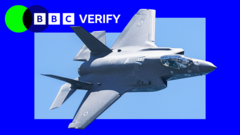In light of the ongoing Gaza conflict, British Foreign Secretary David Lammy has voiced his discontent over Israel's military actions in the region, stressing the potential for the UK to enhance its response if no change occurs in Israel’s war approach. Amidst growing public scrutiny over military support, questions loom about the UK's role and responsibilities regarding arms sales to Israel, particularly the contributions towards advanced military technologies like the F-35 fighter jet.
UK Arms Export Controversy: Scrutiny Intensifies over Military Support to Israel

UK Arms Export Controversy: Scrutiny Intensifies over Military Support to Israel
As conflicts in Gaza escalate, UK Foreign Secretary David Lammy raises concerns about Britain's military ties to Israel while emphasizing the need for accountability.
Over the past years, the UK has approved arms export licenses to Israel totaling over £500 million, with significant components linked to military equipment utilized in the conflict. While the UK government maintains that its support does not directly translate to assistance in Israel's ongoing operations, campaigners emphasize the visibility of the military aid and the moral implications of continued sales amid humanitarian crises.
Several key elements remain unanswered concerning the extent of the UK's military exports and collaboration with Israel, including intelligence sharing, military training, and conditions for arms licenses. As the international community reacts, the spotlight on the UK’s military relationships with Israel grows, with calls for accountability and review becoming more urgent.
The conflict in Gaza is prompting serious inquiries regarding the UK’s military assistance to Israel. Foreign Secretary David Lammy's recent comments highlight the need for introspection on arms exports, amidst troubling reports of violence against civilians in the region. The UK has issued arms licenses totaling over £500 million to Israel in the past eight years, with parts for advanced fighter jets being a focal point of criticism.
Calls for public inquiries into military support have risen as there are questions over whether UK-made components in weapon systems significantly contribute to the situation on the ground. Political and public sentiments are shifting, urging the government to redefine its role in this conflict while balancing traditional arms trading partnerships with moral obligations. The extent of military intelligence sharing and real-time operational support remains partially obscured, raising ethical concerns that need addressing as the international community continues to monitor developments closely.
Several key elements remain unanswered concerning the extent of the UK's military exports and collaboration with Israel, including intelligence sharing, military training, and conditions for arms licenses. As the international community reacts, the spotlight on the UK’s military relationships with Israel grows, with calls for accountability and review becoming more urgent.
The conflict in Gaza is prompting serious inquiries regarding the UK’s military assistance to Israel. Foreign Secretary David Lammy's recent comments highlight the need for introspection on arms exports, amidst troubling reports of violence against civilians in the region. The UK has issued arms licenses totaling over £500 million to Israel in the past eight years, with parts for advanced fighter jets being a focal point of criticism.
Calls for public inquiries into military support have risen as there are questions over whether UK-made components in weapon systems significantly contribute to the situation on the ground. Political and public sentiments are shifting, urging the government to redefine its role in this conflict while balancing traditional arms trading partnerships with moral obligations. The extent of military intelligence sharing and real-time operational support remains partially obscured, raising ethical concerns that need addressing as the international community continues to monitor developments closely.





















